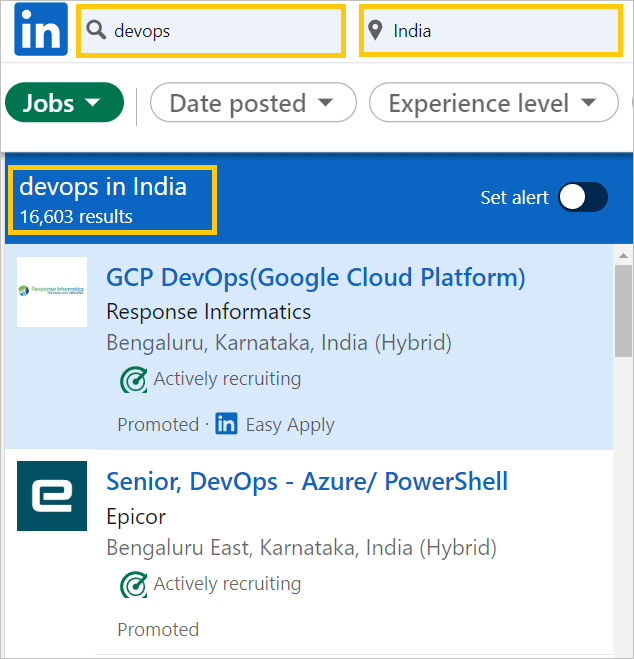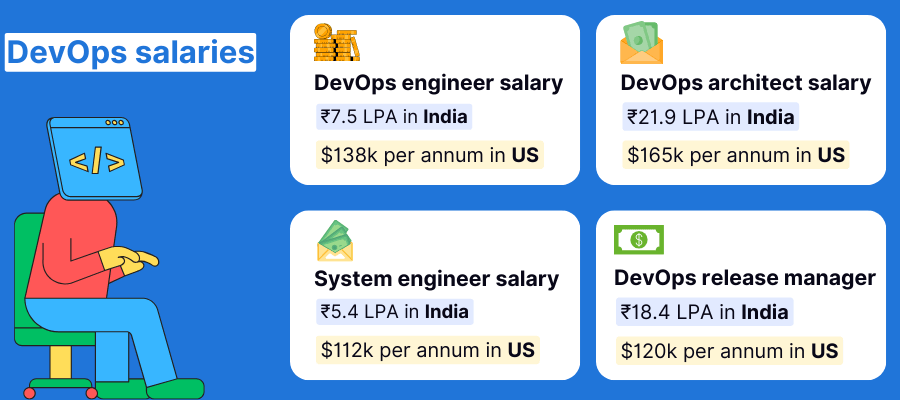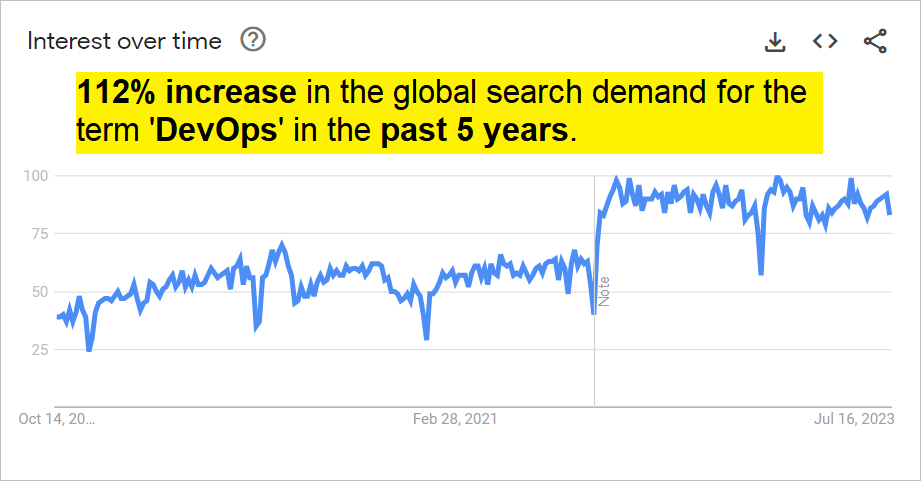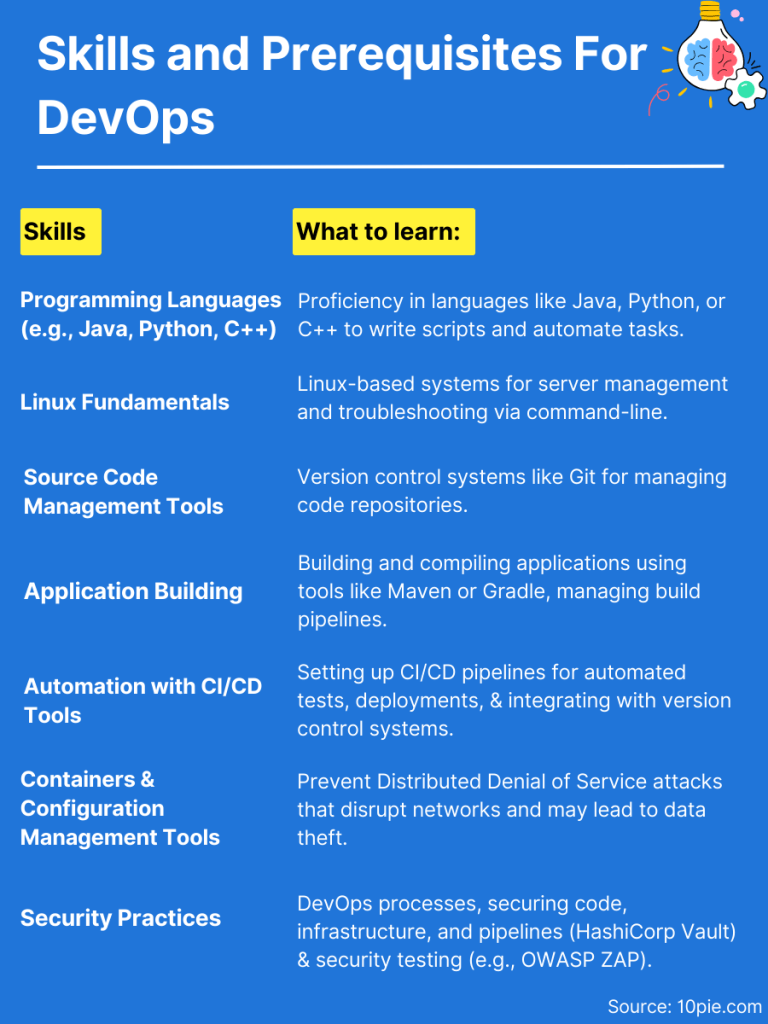If you want to start your career in DevOps or plan your DevOps career path, ask the following questions:
- Why choose a career in DevOps in 2023
- What are the job roles and responsibilities of a DevOps engineer
- What are the career paths
- Are there enough jobs available?
- What are the skills required to become an expert DevOps engineer?
- What are the resources to start learning about DevOps?
In this guide, I will help you answer each of the above questions with a data-driven approach.
So, you can decide and plan your career path and become a successful DevOps engineer in 2024.
What’s covered in this DevOps career path guide:
Is DevOps a good career path in 2023?
Yes, DevOps is a good career choice in 2023 since it is seeing rapid growth and the demand for qualified DevOps.
Some reasons to consider a career in DevOps include:
- When I searched the available DevOps jobs on LinkedIn, I found more than 16,000 active job requirements posted all across India.

- The average DevOps engineer salary in India and the United States is ₹ 7.5 LPA and $130,000 per annum respectively.

- The global search demand for ‘DevOps’ has increased by 112% in the past 5 years, based on Google Trends data.

- DevOps opens up many career options, from automation and robotics to web development and mobile app development.
These data points indicate that there is a good career opportunity for anyone looking to start their career in DevOps.
What is DevOps?
DevOps is a set of practices that combines software development (Dev) and IT operations (Ops). The job profile of a DevOps specialist represents an individual who is highly capable in both development and operations.
DevOps aids in the detection, resolution, and documentation of issues in software engineering. DevOps engineers can develop software using manual techniques and tools such as source control, testing frameworks, version control systems, continuous integration services, etc. They can also support the deployment process using automated deployment tools, release management, etc.
Put simply, DevOps aligns development and IT operations with better communication and collaboration.
What does DevOps do?
A DevOps engineer communicates with development and operations teams to design and deploy software solutions. Requires them to work with software developers and quality assurance specialists.
Day-to-Day Tasks:
- Design and implement new software solutions.
- Assess current software strengths and weaknesses.
- Work with other IT personnel to improve existing software quality. They may also develop additional tools and processes.
- Automate the deployment of updates into production using configuration management software.
- Do frequent application maintenance and troubleshooting to ensure the production environment functions well.
- Conduct a gap analysis to detect performance increases, alternative solutions, and changes.
DevOps Career Path in 2023
| Devops career Path | Experience | Avg. Annual Salary (India) | Avg. Annual Salary (US) |
| DevOps Engineer | 0-2 years | ₹7.5 lakhs | $138,000 |
| DevOps Architect | 4-6 years | ₹21.9 lakhs | $165,000 |
| System Engineer | 1-6 years | ₹6.3 lakhs | $102,044 |
| DevOps Release Manager | 4-9 years | ₹12.6 lakhs | $143,000 |
1. DevOps Engineer
A DevOps Engineer is responsible for automating, optimizing, and ensuring the reliability of software deployment, infrastructure management, and system maintenance. They work collaboratively with development and operations teams to enhance an organisation’s efficiency, security, and innovation.
Years of experience required: 0-2 years.
Average annual salary: ₹7.5 lakhs in India and $138k per year in the US
Roles and responsibilities:
- Build, maintain, and enhance DevOps processes and infrastructure.
- Coordinate with development, testing, and operations teams
- Write deployment, debugging, and testing scripts.
- Create reusable organization code.
- Gather developer feedback on software quality.
- Troubleshoot issues and keep projects on track.
- Adapt to changes using Agile principles.
- Ensure proper functioning of computer systems and networks.
- Promote a culture of timely, high-quality software development.
Key skills required:
- Proficiency in scripting languages like Python, Ruby, or JavaScript.
- Familiarity with configuration management tools, automation frameworks, and Linux environments.
- Often requires at least a bachelor’s degree in related fields.
Learn the steps and skills required to become a Python developer.
2. DevOps Architect
DevOps Architect plays a pivotal role in coordinating the integration of development and operations processes, automating workflows, enhancing security, and optimizing performance.
Years of experience required: 4- 6 years
Average annual salary: ₹21.9 lakhs in India and $165k per year in US.
Roles and responsibilities:
- Develop and establish an organisational DevOps structure.
- Customise and implement DevOps practices to meet specific needs.
- Automate processes using suitable tools for streamlined operations.
- Enable and integrate development operations effectively.
- Manage and lead teams efficiently.
- Resolve issues within development and operations.
- Implement architectural strategies comprehensively.
- Create a growth-oriented environment for growth.
- Monitor and optimise technical processes.
Key skills required:
- Innovative system architecture assessment and redesign skills.
- Enhancing development and operations collaboration through new channels.
- Proficiency in automation tools and CI/CD concepts.
- Expertise in relevant coding languages.
- Familiarity with infrastructure automation tools (Chef, Puppet, Ansible).
- Multidisciplinary leadership and teamwork abilities.
- Solutions for data movement and processing.
- Proficiency in Unix/Linux environments and coding languages (Shell, Perl, Python).
- Deployment pipeline evaluation and troubleshooting.
3. System Engineer
System Engineers are critical members of IT and engineering teams who design and manage composite systems throughout their lifecycle. They are crucial in identifying stakeholder demands, system performance, and early-phase service or product development in complex digital environments.
Years of experience required: 1-6 years.
Average annual salary: ₹5.4LPA in India and $112,504 in the US.
Roles and responsibilities:
- Evaluate and propose solutions for system issues.
- Plan, execute, and manage projects efficiently.
- Ensure effective collaboration among teams.
- Configure and test software platforms and tools.
- Maintain system availability and support tasks.
- Implement system automation and support specialised needs.
- Adhere to industry standards and optimise work processes.
Key skills required:
Technical Skills and Education:
- Proficiency in project planning, resource management, and problem-solving.
- Broad understanding of IT, programming languages, and automation tools.
- Skills in coordinating, leading, and fostering teamwork.
- Proficiency in coding and scripting languages.
- Knowledge of system architecture principles.
- Firm grasp of system security and integration concepts.
- Familiarity with industry-specific requirements.
- Ability to make informed decisions.
- Effective problem-solving skills.
- Leadership skills for team coordination.
4. DevOps Release Manager
Release Managers oversee the coordination and optimisation of software release processes to ensure timely delivery and quality.
Years of experience required: 4-9years
Average annual salary: ₹18.4 LPA in India and $120,000 per year in the US
Roles and responsibilities:
- Manage risks and resolve challenges affecting release scope, quality, and schedules.
- Plan release windows and cycles across portfolios and components.
- Coordinate with cross-functional teams and communicate release plans.
- Monitor progress, budgets, and quality standards for timely software releases.
- Develop and maintain release schedules, deployment plans, and automation tools.
- Validate release notes and ensure requirements clarity across project streams.
Key skills required:
Technical Skills and Education:
- Strong programming skills and infrastructure management expertise.
- Proficiency in release management and configuration management tools.
- Understanding of software development lifecycle.
- Excellent communication and analytical skills.
- Cross-functional team coordination and structured thinking.
Job Outlook for DevOps
The Global market for DevOps is expected to expand during the forecast period, with a Compound Annual Growth Rate (CAGR) of 19.7%. It is projected to grow from an estimated USD 10.4 billion in 2023 to USD 25.5 billion by 2028.
DevOps Market Drivers:
- Increase in demand for continuous and foster application delivery
- Growing focus on lowering CAPEX and OPEX
- Rising Preference for microservice architecture
DevOps Market Opportunities:
- Increasing Demand for Collaboration between IT and Operations team
- Use of AI in application development
- Growing adoption by SMEs
It is expected that the DevOps industry will reach the $10.4B market size by the end of 2028 with a compound growth rate (CAGR) of 19.7%.
Professionals with expertise in merging development and automation tools are in high demand across various industries like banking, healthcare, education, and manufacturing. These industries are looking to improve their operational processes through DevOps— which is creating a lot of job opportunities.
In fact, when I searched for the DevOps job opportunities on LinkedIn, I found that there are more than 46,000 DevOps jobs available in the United States— which highlights the demand for skilled DevOps engineers all over the world.

Although there is a lack of standardized definitions in the field, the increasing adoption of IoT technology offers new opportunities for DevOps specialists. Those who can enhance agility, security, and efficiency in this expanding field will find promising career prospects.
Skills and prerequisites to become a DevOps Engineer

DevOps engineers work with several tools to implement continuous integration and deployment. Such devices include Jenkins, Git, Puppet, Chef, Kubernetes, and Ansible.
Here are the following skills and prerequisites to become a DevOps engineer:
1. Programming Languages (e.g., Java, Python, C++)
- Proficiency in one or more programming languages, such as Java, Python, or C++, is essential for writing scripts and automating tasks.
- Developing and maintaining tools and scripts to streamline processes is also essential.
2. Linux Fundamentals
- Strong understanding of Linux-based operating systems.
- Command-line proficiency for server management and troubleshooting.
3. Source Code Management Tools (e.g., Git, CVS)
- A deep understanding of version control systems, such as Git, is required for managing code repositories.
- Implementing collaborative development and employing effective code-branching strategies are crucial.
4. Application Building
- Building and compiling applications with the assistance of tools like Maven or Gradle.
- Ensuring proper artifact management and the maintenance of build pipelines are also essential tasks.
5. Automation with CI/CD Tools
- Setting up and configuring CI/CD pipelines for automated builds, tests, and deployments.
- Integrating with version control systems and other tools.
6. Application Testing
- Writing and running automated tests using testing frameworks and tools.
- Implementing testing as part of the CI/CD pipeline.
7. Containers and Configuration Management Tools (e.g., Docker, Ansible)
- It is crucial to have expertise in Docker for containerisation, which includes packaging applications and their dependencies.
- Utilising Ansible or similar tools for configuration management automating server provisioning and configuration, is essential.
8. Monitoring Applications
- Implementing and monitoring solutions like Prometheus, Grafana, or Nagios.
- Setting up alerting and monitoring dashboards for applications and infrastructure.
9. Cloud Service Providers and Their Basic Applications
- Knowledge of major cloud platforms like AWS, Azure, or GCP.
- Understanding cloud providers’ primary services, such as virtual machines, databases, and storage.
10. Security Practices
- Implementing security best practices within DevOps processes.
- Securing code, infrastructure, and pipelines with tools like HashiCorp Vault and security testing (e.g., OWASP ZAP).
The Future of DevOps – Will AI Replace DevOps Engineers?
AI and DevOps are both exciting tech fields, merging in interesting ways. Many companies are exploring how AI can make DevOps smoother and more efficient.
Using AI, we can automate repetitive chores, optimise resource use, and make smarter decisions.
People often ask if AI will take over the roles of DevOps or engineers in this field. AI can indeed enhance DevOps, but it won’t replace individuals.
Instead, it will partner with skilled DevOps engineers to improve operations.
Here are which DevOps tasks can be replaced by AI and which tasks will likely require human involvement:
| Task | AI | Human |
| Coding | ✅ AI tools like GitHub Copilot and DeepDev can assist with writing code. | ❌ AI lacks creativity and the ability to think outside the box. |
| Testing | ✅ AI can automate testing across different environments. | ❌ AI struggles with edge cases and complex scenarios. |
| Monitoring | ✅ AI tools like AIOps use ML to monitor systems and detect anomalies. | ❌ Humans are still needed to interpret alerts and take appropriate actions. |
| Documentation | ❌ AI struggles to generate comprehensive and clear documentation that humans can understand. | ✅ Humans are better at communicating complex ideas. |
| Troubleshooting | ❌ AI lacks the common sense and intuition to handle unknown issues. | ✅ Humans can think creatively to resolve problems. |
| Decision making | ❌ AI lacks the ability to understand context and make strategic decisions. | ✅ Humans can consider multiple factors and make value judgments. |
| Team management | ❌ AI has not advanced to the point of managing complex human relationships. | ✅ Humans are needed to motivate teams and resolve conflicts. |
| Security | ✅ AI can automate some security tasks like vulnerability scanning. | ❌ Humans are still needed to think like attackers and identify new threats. |
| Infrastructure management | ✅ AI can automate infrastructure provisioning through tools like Terraform. | ❌ Humans are needed to design optimal infrastructure based on business needs. |
Apart from these 6 DevOps tasks, there are many other DevOps tasks like resource allocation, cost management, automated configuration, predictive analysis, incident management, etc., in which AI can do better than humans.
Check our detailed guide on how DevOps engineers can take advantage of artificial intelligence.
Limitations of using AI
- Lack of Human Context
- Inaccuracy
- Black box problems
- Cost and resource allocations
- Security and Compliance
AI likes human context and intuition, which are crucial for problem-solving and decision-making. That is why DevOps engineers are still needed, because many times when you find problems and issues that you have never experienced before, AI cannot help in that situation and still needs a DevOps engineer.
AI gives you output and results based on the data that it is trained on. If you train AI on poor and biased data, it will give wrong results, which will cause problems in your workflows.
Sometimes, AI is trained on historical data, which can not be relevant in current or future scenarios.
If you let AI do DevOps tasks, it can cause issues and pull your production down.
Still, we need developers to edit or create script shift files to configure DevOps tools; pipeline AI can’t do those. It can do routine tasks. Even with any dependency failure or test case failure, AI can’t act on it.
How Difficult is DevOps?
Starting a career in DevOps engineering may seem challenging at first, but it is actually very achievable for students, and here are six compelling reasons why:
- High Demand
- Varied Skill Set
- Continuous Learning
- Collaborative Environment
- Flexibility
- Career Growth
The DevOps career path demands s set of technical and soft skills. Also, proficiency in various tools like AWS, Ansible, Git, and CI/CD pipelines is important to have but takes time to master.
Here’s a table of technical skills required for DevOps and the approximate time to learn the basics:
| Technical Skill | Approximate time to learn |
| Git | 1-2 weeks |
| Linux/Unix Command Line | 2-3 weeks |
| Basic Scripting (e.g., Bash) | 3-4 weeks |
| AWS Fundamentals | 4-6 weeks |
| Configuration Management (e.g., Ansible) | 4-6 weeks |
| Continuous Integration/Continuous Deployment (CI/CD) Concepts | 2-3 weeks |
| Docker and Containerization | 3-4 weeks |
| Basic Networking Concepts | 2-3 weeks |
| Monitoring and Logging Tools | 2-4 weeks |
| Infrastructure as Code (e.g., Terraform) | 4-6 weeks |
How do I start a career in DevOps?
1. Master a programming and scripting language
To manage DevOps projects, you need to master at least one programming language. These can be Python, Golang, Ruby, Java, PHP, JavaScript and a few more. You need them to automate processes, integrate databases, and debug code. If you use Linux, the best scripting language for DevOps projects is Bash.
2. Learn Operating Systems
You need knowledge of operating systems to work, communicate with your team, and run the servers where you will be deploying your applications. You must know certain operating systems like Windows, Linux, macOS, Android, and iOS.
3. Get a bachelor’s degree
Employers prioritise the skills of a DevOps engineer over their education. However, most still value a degree that showcases you earned a well-rounded education. You can complete a bachelor’s degree in computer science, software engineering, information technology, computer programming, and other related fields.
4. Gain practical experience in DevOps projects
While some courses give you exposure to DevOps projects, you need to have your practice session. You can also enrol in internships to gain real-world experience.
Then, open an account on GitHub and upload all your DevOps projects. Put the link to your account on your resume. Connecting with DevOps professionals is another great way to gain experience in the industry, understand new trends, and find DevOps opportunities.
Do DevOps engineers need coding skills?
Yes, DevOps engineers need coding skills for different purposes, but it is not mandatory. The need for coding skills is dependent on the organisational needs, infrastructure complexity, and the role of DevOps engineers. Here are a few reasons why having coding skills is an advantage
- Automating processes
DevOps engineers can write codes and scripts to automate multiple tasks like tasting, deployment of applications, and monitoring.
- Infrastructure as code (IaC)
It is a primary DevOps practice that helps teams manage infrastructure as code. DevOps engineers can use their coding skills to define different infrastructure components like servers, networks, and databases.
- Debugging and troubleshooting
When there is an error in the software development process, a DevOps engineer can use their programming skills to debug and troubleshoot the issue effectively. Good coding skills help them analyse different codes and identify the problem efficiently.
- Collaboration with developers
These engineers often need to collaborate with developers to deliver high-quality applications to the market. Knowledge of coding helps them understand an application’s underlying codes and communicate effectively with the developers.
What qualifications do I need to be a DevOps?
- Knowledge of programming language
DevOps engineers must acquire at least one programming knowledge. While for beginners Python is the best choice, there are numerous others like Golang, Ruby, Java, PHP, JavaScript, HTML, and more.
- Understanding of operating systems
You must learn to use certain operating systems like Windows, Linux, MacOS, Ubuntu, and Unix. Learning OS means knowing both hardware and common functions like memory management, storage management, file management, command interpreter system, I/O device management, and more.
- How to operate in the terminal
You must understand how to perform system tasks without using a graphical user interface. For that, you must learn how to do bash scripting, process monitoring, text manipulation, networking, system performance, and compiling apps from source. You need to get familiar with Powershell, Vim, Nano, and Emacs.
- Knowledge of networking, security, and protocols
As a DevOps engineer, you must understand how protocols support different request types. It will reduce the risks of cyberattacks, stealing people’s data while transferring and intercepting their applications. If you want to work in the cybersecurity domain, knowing networking, security, and protocol is important. You can learn a few things like HTTP, HTTPS, SSL, and SSH.
- Learn server administration
DevOps engineers need to monitor servers and fulfil requests when any user asks for information. This mandates them to learn server administration of certain web servers like Apache, Tomcat, IIS, Envoy, Linkerd, Caddy, Istio, and NGINX.
- Use of containers and container orchestration
Containers gather all application codes, libraries, and dependencies so that once a code is written, you can run it anywhere. DevOps engineers need to understand these containers and container management for faster application development and deployment.
- Basic idea of microservices and mini services
Knowledge of the latest architecture patterns can help you stay out of the competition. While most of the DevOps engineers depend on miniservices, learning microservices architecture will be essential in the future. These architecture patterns improve scalability and system resilience, as well as technology stack flexibility and faster deployments.
- Know infrastructure as code
DevOps engineers must understand several key aspects of infrastructure as code that treats infrastructure as a code to automate processes. Some tools that you need to familiarise yourself with are Puppet, Docker Swarm, Terraform, Istio, Chef, and a few more.
- Use of continuous integration and continuous deployment tools
Knowledge of CI/CD (Continuous Integration and Continuous Deployment) tools is essential for DevOps projects. These tools help in automating processes and free up time for essential tasks. Some of them are GitHub, Jenkins, GitLab, and Bamboo.
- Practice monitoring software and infrastructure
One of the primary functions of a DevOps engineer is to monitor applications and infrastructure to improve efficiency and resolve errors. It requires professionals to observe data from applications, network devices, servers and more, and track different metrics like network throughput, hardware capacity, etc. You can learn certain tools like Datadog, Prometheus, Grafana, Nagios, and Zabbix.
DevOps Course Certifications to Start Your Career
1. AWS Certified DevOps Engineer – Professional
Course Fee: $300
This certification from Amazon Web Services shows employers you can test and deploy AWS applications and infrastructure.
This certification validates your expertise in deploying and managing applications on AWS, implementing DevOps practices, and optimizing the entire software development and delivery lifecycle.
2. DevOps foundation certification
Course fee: $1,000
The course aims to provide a comprehensive understanding of DevOps principles, practices, and methodologies to bridge the gap between development and operations teams.
The key highlights of the course include:
- Accreditation from the DevOps Institute (PeopleCert)
- Live instructor-led training by certified professionals
- Earning 16 PDUs/SEUs/CPDs upon completion
- Mastering essential skills like automation, testing, and collaboration
- Two-year validity of the DevOps Foundation certification
- Preparation for successfully passing the certification exam
3. The AWS Certified DevOps Engineer
Course Fee: $300
Professional certification is offered by Amazon Web Services (AWS). It is designed for experienced professionals who specialise in DevOps practices and have extensive experience with AWS services.
4. Certified Kubernetes Administrator (CKA)
Course Fee: ₹3199
Learning Kubernetes is essential for any DevOps professional. Prepare for the Kubernetes Administrators Certification with live practice tests in the CKA course from Udemy.
5. Introduction to DevOps by Great Learning
Course Fee: Free
This Course from Great Learning is perfect for beginners to start with free certification on DevOps. This course is online and offers hands-on from experts in Dockers and Jenkins.
6. Microsoft Certified: DevOps Engineer Expert
Course Fee: $165
This certification can open up opportunities to work on cutting-edge projects and lead DevOps initiatives within organizations.
Candidates for this certification must have experience administering and developing in Azure and have strong skills in at least one of these areas. They should have experience using both Azure DevOps and GitHub.
7. Microsoft Certified: DevOps Engineer Expert
Course Fee: $165
This certification exam assesses source control, pipelines, security, compliance, and instrumentation skills.
8. DevOps Crash Course: CI/CD with Jenkins Pipelines Groovy DSL
Course Fee: Free
In this free DevOps course, you’ll acquire essential skills, including understanding the fundamentals of Jenkins architecture and mastering the Job DSL Plugin on Jenkins.
How to get my first job as a DevOps engineer?
- Make your resume stand out of the crowd
Candidates put a lot of effort into crafting their resumes, but recruiters may not have that much time to read them in detail. If you want to hit the mark, make sure to keep your resume to the point.
Add project links to your resume. Or update them on your GitHub account and share the link on your resume. This showcases your skills and expertise and increases your chance of getting hired.
Use design tools like Canva to create a professional-looking resume and avoid using buzzwords or cliches.
- Apply for a job at an agency
Working in an agency is better than in-house because it gives you a wide number of opportunities to grow quickly. You can work with multiple clients and create a portfolio of varied projects.
- Prepare for interview
Before appearing for an interview, prepare for it. Some institutes offer interview preparation upon completion of the training course. You can also prepare for an interview using Google or YouTube videos.
If you are appearing for a video interview, download popular video conferencing software like Google Meet, Zoom, and Microsoft Teams. Run a test call to check your mic and webcam.
Make sure to check the company details before appearing for their interview. Check their website and latest social media posts to understand what they are exactly looking for from a candidate.

Mouri Roy is a dedicated Software Developer and an experienced Technical Content Writer with more than 2 years of experience, currently in pursuit of her B-Tech in Computer Science and Engineering at Techno Main Salt Lake.
With a strong foundation in both practical software development and the art of crafting compelling tech content, Mouri is poised to make a significant impact in the tech industry.
Mouri’s journey in the world of technology has been nothing short of inspiring. Her practical experience in Software Development spans across esteemed organizations such as VYOMOLOGY Private Limited and Hellbent, where she honed her skills in an array of cutting-edge technologies.
Her expertise includes Java, ReactJs, NodeJs, ExpressJs, MongoDB, SQL, HTML, CSS, JavaScript, and Bootstrap, making her a versatile and sought-after developer.

